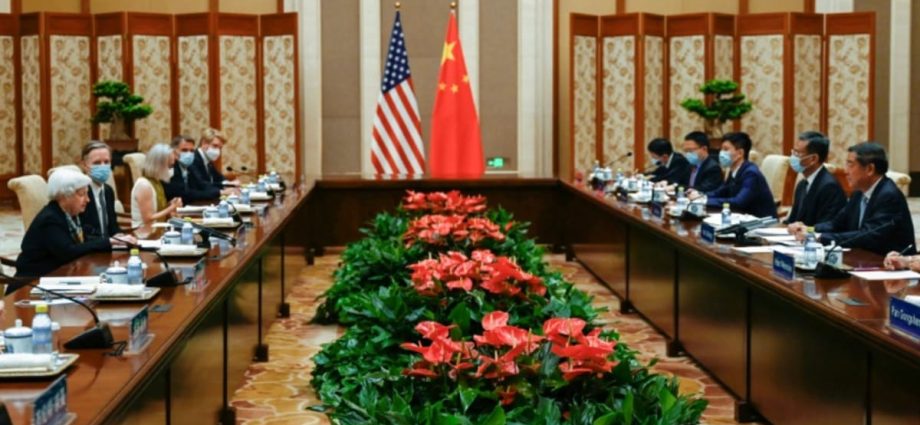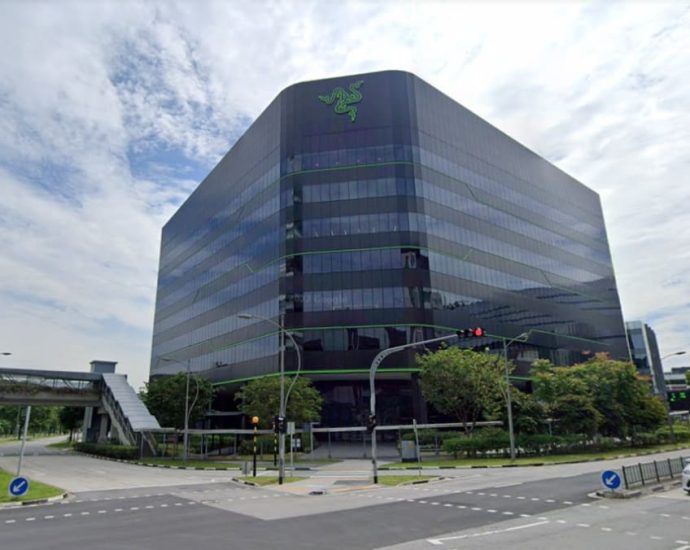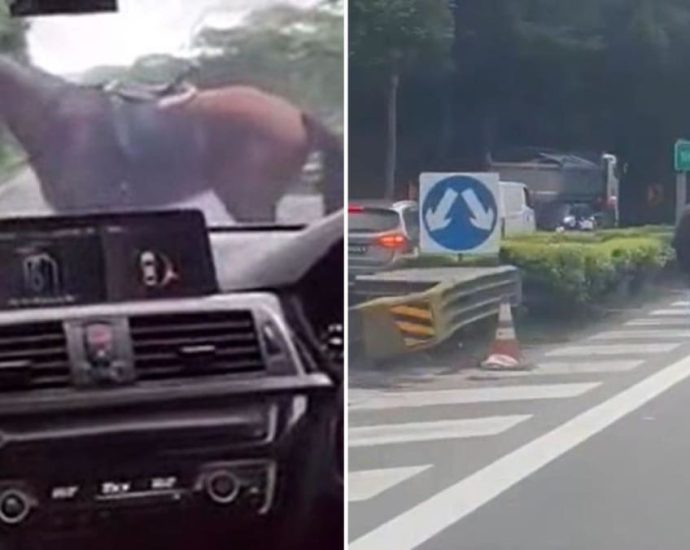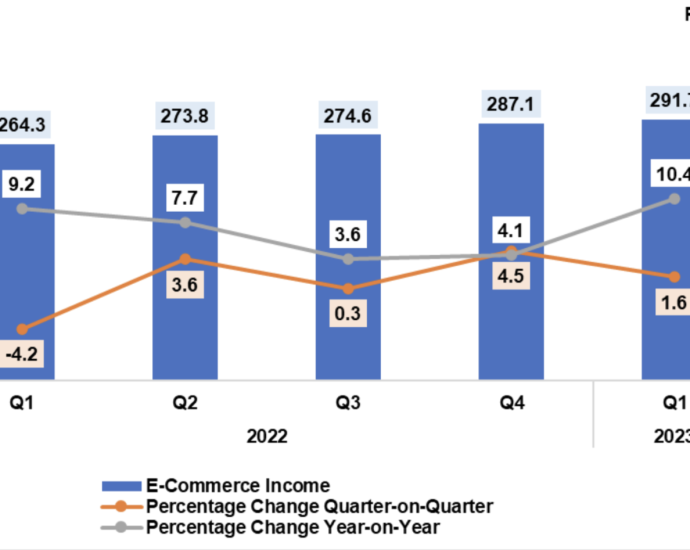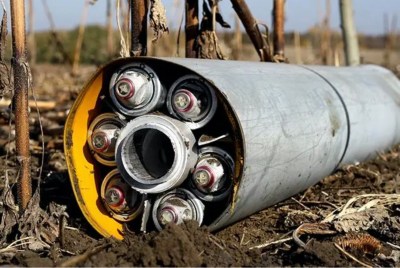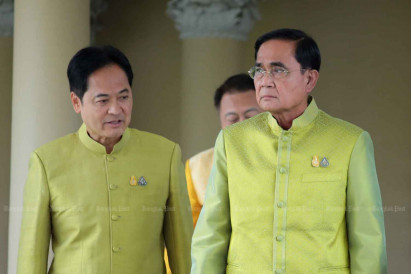Tech rally lifts Hong Kong but Asia rally stutters on China data
HONG KONG: Hong Kong rose on Monday (Jul 10) in hopes that Beijing has ended its long-running crackdown on the tech sector, but an early Asia-wide rally was staunched by inflation data showing further weakness in China’s economy. After a years-long probe, Ant Group was hit with a near US$1Continue Reading
Protest site ready ahead of ‘problematic’ vote for PM

An area near the parliament has been prepared for demonstrators when the House and Senate meet on Thursday to vote on who should be the new prime minister, a vote some senators warn could be problematic.
House Speaker Wan Muhamad Noor Matha said on Monday that vacant land owned by the Bangkok Metropolitan Administration opposite Thahan Road would be available for demonstrators when the parliament convenes in joint sitting at 9.30am on Thursday.
Demonstrators should not gather in front of the parliament itself because there was construction work going on which could pose a danger to them, Mr Wan said.
He had coordinated with City Hall in arranging the nearby area be available. It had a clear view of the parliament and there would be tents and toilets available for people there.
Mr Wan asked that demonstrators help maintain order. Thursday’s meeting was a significant event and the parliament an important place.
Bangkok Governor Chadchart Sittipunt said on Monday the 5-rai area was in the grounds of a City Hall complex and could accommodate about 600 people.
Eight coalition allies plan to nominate Pita Limjaroenrat, leader of the election-winning Move Forward Party, as the next prime minister at Thursday’s meeting. However, Mr Pita is facing complaints about his eligibility for political office over an inherited shareholding in iTV Plc that he managed as executor of his father’s estate.
The constitution prohibits a shareholder of a media organization from running in a general election. Anyone who does so knowing they were not qualified is liable to penalities including imprisonment, fines and suspension of electoral rights.
Senator Direkrit Jenkhrongtham said that unless there is a clear ruling on Mr Pita’s eligibility ahead of the meeting, there would be a big debate.
He warned parliamentarians they could be held in violation of the constitution if they vote for Mr Pita while being aware his eligibility was in question.
Mr Direkrit said unless the prime ministerial vote was postponed, many senators may abstain.
Senator Seree Suwannapanon said MPs of the eight coalition allies could be seen as violating the constitution if they vote for Mr Pita, and their parties may risk legal penalties including disbandment.
However, Senator Ampol Chinawatana said he would vote for a prime ministerial candidate from the political parties that had a majority in the House, so that the new government would also have majority support.
Appearing to support Mr Pita, Senator Ampol said the people’s choice must be respected, otherwise there was no point in having a general election.
The constitution requires the new prime minister be supported by a majority of the combined vote of the 500 members of the House of Representatives and the 250 senators – a minimum 376 votes.
IT vendor appeals against US$6.5 million in damages awarded to gaming firm Razer over data leak

THE APPEAL
Lead counsel for Capgemini, Mr Andy Leck from Baker McKenzie Wong & Leow, put forth three grounds of appeal during the three-hour hearing.
He argued that High Court judge Lee Seiu Kin was wrong in finding that Razer discharged its burden of proving damages for loss of profit; that Razer did not fail to mitigate its losses by its delay in responding to Mr Diachenko’s repeated warnings; and that Razer was not contributorily negligent for said delay.
The issue began in June 2020 when a Capgemini employee was tasked with helping Razer with a login problem on an internal IT system.
Mr Argel Cabalag had added a “#” command to a configuration file that controlled security and access to an application. The misconfiguration then disabled the security settings of the application, eventually leading to the data breach.
Mr Diachenko first contacted Razer’s support team on Aug 19, 2020, saying he had come across an unprotected, publicly available database that appeared to contain the personal data of Razer’s customers.
When Razer did not respond, Mr Diachenko reached out another four times on Aug 20, Aug 22, Aug 27 and Sep 9.
Razer’s management team found out about the breach on Sep 9. Mr Cabalag resolved the issue within a day.
Among his arguments in court, Mr Leck noted Razer’s own evidence – that it would have provided an “orderly resolution” if its cyber security and compliance process architect at the time, Ms Tiong Lee Lan, took reasonable steps to ensure the data leak was brought to her attention.
Razer also admitted that Ms Tiong had failed to respond to Mr Diachenko immediately and escalate his warnings in accordance with protocol, added Mr Leck.
Razer had given evidence that Mr Diachenko would have released information on the data leak regardless of what Razer had done in response to his warnings, while Capgemini did not provide any evidence to suggest that the reverse was true.
WARNING LETTER ISSUED
Razer had also issued a warning letter to Ms Tiong – a point that Mr Leck said was “very important” to their case.
The letter stated that “the extent of the issue would have been significantly mitigated” if Ms Tiong had carried out the appropriate incident response or evaluated the veracity of Mr Diachenko’s initial email.
In finding that Razer was not contributorily negligent for the data breach, Justice Lee wrote in his judgment he did not think the “wording of an internal company reprimand” would “shed any light on whether Razer caused the damage or would have suffered less damages if it acted promptly”.
Mr Leck argued that Justice Lee had failed to put adequate weight on the warning letter.
In response, Razer’s lead counsel, Mr Wendell Wong from Drew & Napier, asked what extent of reaction time could be deemed a breach. He also questioned how much Capgemini wanted to reduce the damages.
Judge of the Appellate Division Woo Bih Li told him: “Speaking for myself, your opponent may have a point. If you all had gotten back to Mr Diachenko promptly and assured him things would be done, maybe (the news articles reporting on the data leak) would have been done differently.
“But you didn’t and frankly speaking, that’s my concern. Why should it be zero when it comes to contributory negligence?” Justice Woo asked.
When Mr Wong said they agreed there had been a delay on Razer’s part, the judge challenged him on whether he accepted Razer was contributorily negligent.
Mr Wong responded: “I can only say this. In terms of evidence led, I understand about the internal letter and we were late in responding to Diachenko.
“But our humble submission is that when you look at overall schematics, they were not negligent in failing to respond within the three weeks we talked about.”
Mr Wong also said that Capgemini did not provide evidence on how Mr Diachenko would have reacted if Razer promptly responded to him.
In response, Justice Woo noted that ironically, one could argue that Razer was more negligent because Capgemini’s error “seemed inadvertent”.
“(Razer was) told about (the data breach) a few times over a few weeks. It was not that Ms Tiong forgot to respond to it,” the judge added.
“She was told about it a few times and then various other people in Razer’s team were also informed. This went back and forth for three weeks. Then Razer said, ‘I will sue you for negligence and we say we’re not negligent.’
“I find that very hard to accept.”
Justice Woo and the other two judges hearing the appeal – Justices Kannan Ramesh and Andre Maniam – eventually directed both parties to discuss whether they can agree on how much the awarded damages should be reduced. This is if the court finds contributory negligence or a failure to mitigate on Razer’s end, or a similar type of defence.
The court asked the lawyers to revert by Jul 17, and reserved its decision in the meantime.
Horse seen galloping on BKE ‘safely returned to stable’
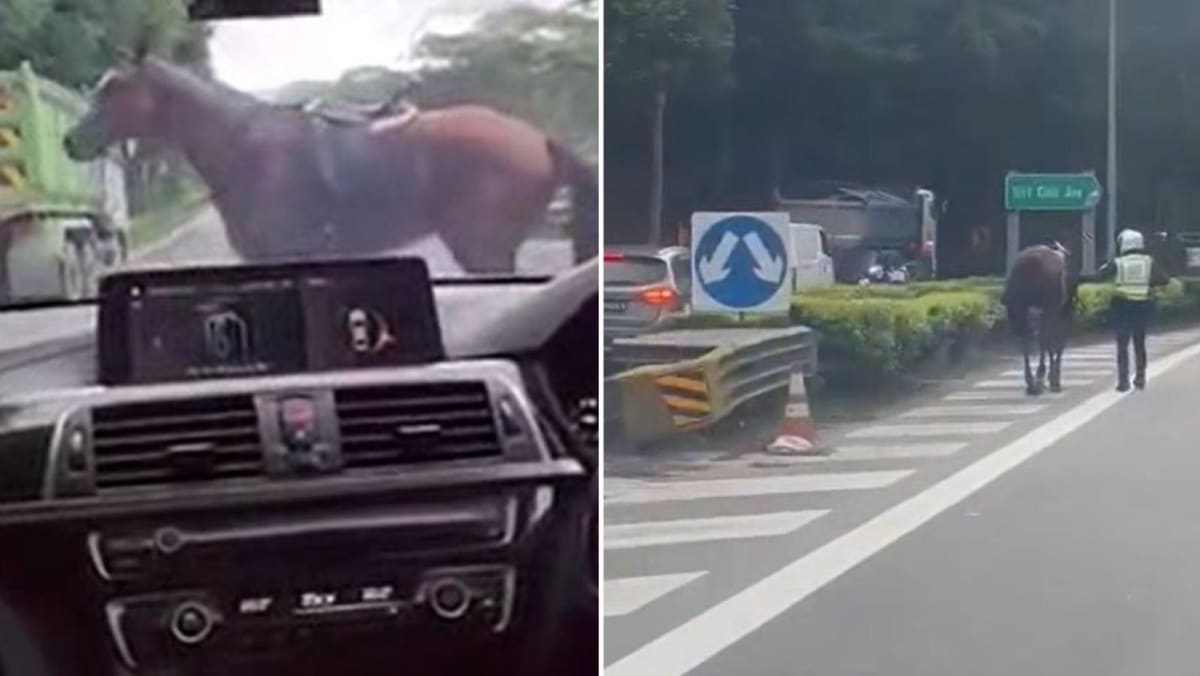
SINGAPORE: A brown horse seen galloping along the Bukit Timah Expressway (BKE) in videos circulating online over the weekend “has since been safely returned to its stable”, said a Singapore Turf Club spokesperson on Monday (Jul 10).
The spokesperson added the horse belonged to the Bukit Timah Saddle Club, and the Turf Club was aware that the horse had found its way outside of its stable and “onto the roads briefly”.
“We thank everyone for their care and concern, especially motorists for their patience.”
Bukit Timah Saddle Club acknowledged the incident but declined to comment when contacted by CNA.
In a video that was posted on the Singapore Incidents Facebook group, the horse was seen galloping on the expressway, while weaving through traffic. The horse then turned around before walking past a car.
In another video, the horse was escorted away from traffic near the Turf Club Avenue exit on the BKE by a Land Transport Authority (LTA) official.
When contacted by CNA, LTA declined to comment on the incident.
CNA has also contacted the National Parks Board (NParks) for comment.
This is not the first time a horse has been spotted on Singapore’s roads. In March last year, a black horse was filmed trotting along Turf Club Road in Bukit Timah. It was captured “just minutes” after it escaped, according to riding school Gallop Stable.
TODAY also reported that in August 2021, a grey-white horse was spotted along Vanda Link near Turf Club Road, though it was unclear where it was housed.
A similar incident also took place in 2020, when a white horse was spotted galloping at a traffic junction along Eng Neo Avenue, also in the same area as Turf Club Road.
Horse racing in Singapore will come to an end in October 2024, with the Singapore Turf Club site in Kranji to be handed back to the government in 2027 for redevelopment.
Around 700 horses will be exported and the last race will be held on Oct 5, 2024.
Bukit Timah Saddle Club recently moved from its historic grounds at Bukit Timah to its new home at the Singapore Turf Club, just three months ago at the end of February.
The riding school has 80 horses, while more than 30 others are privately owned in its liveries.
It is also planning to take in five former racing horses from the Turf Club, which will export its 700 horses to countries such as Malaysia before it shuts.
Myanmar violence and South China Sea disputes to dominate ASEAN talks
JAKARTA: Myanmar’s prolonged civil strife, tensions in the disputed South China Sea and concern over arms buildups in the region are expected to dominate the agenda when Southeast Asia’s top diplomats gather for talks this week in Indonesia. Russia’s invasion of Ukraine and the US-China rivalry will also be underContinue Reading
Income of e-commerce transactions in Malaysia rose 10.4% YoY in Q1 of 2023
The first quarter of 2023 recorded a US$62.511 billion growth
Annual e-commerce income for 2022 was US$235.646 billion
Malaysia’s e-commerce income by establishment recorded a notable growth of 10.4% year-on-year in the first quarter of 2023, to reach US$62.511 billion (RM291.7 billion). This growth was primarily driven by Manufacturing and Services sectors. In…Continue Reading
Germany sends troops to Australia in a first as Berlin shifts focus to Indo-Pacific
BERLIN: Germany will, for the first time, send troops to Australia as part of joint drills with about 30,000 service members from 12 other nations, underlining Berlin’s increased focus on the Indo-Pacific amid rising tensions with China in the region. In recent years, Germany has had a greater military presenceContinue Reading
Chinese tourists to Hong Kong, Macao look for more culturally immersive experiences

“As a practitioner in the tourism trade, we see the business logic and opportunity for delving into different communities.”
Smaller merchants, like 118-year-old preserved beancurd shop Liu Ma Kee, have reaped the benefits.
Since China’s reopening, it has made 30 per cent more in sales.
Owner Liu May Tsoi said: “We run a family business. When tourists come in, they tend to chat with us. We want our visitors to feel like home. This feeling is more important when it comes to the development of the city.”
OFF THE BEATEN PATH
Trips to Cheung Chau, an island long seen as a quiet escape away from Hong Kong, have also become more popular.
Travellers have been posting about their adventures to local streets as well as hikes that are off the beaten path on Chinese social media app “Xiao Hong Shu”.
When CNA made the trip to the island, even on a weekday, the ferry – the only way to get to the island southwest of Hong Kong – was nearly at full capacity.
Many of the visitors were from mainland China. Some were there to experience “more authentic and traditional” aspects of the country.
SOME BUSINESSES LAGGING
While some have benefitted, others are struggling to find their space in a new market.
Taipa Village across the sea in Macao is a feast for the senses – the smell of pork chop buns, and Portuguese egg tarts, and the buzz of snaking queues weaving into the next.
Biden belatedly relents on cluster bombs for Ukraine
Washington’s delayed decision to provide Ukraine with cluster munitions, a controversial weapon banned by many US allies, is exposing the risks of depending on a distant and sometime slow-acting power with its own interests primarily at heart.
Since the Ukraine war’s beginning 18 months ago, the US has spearheaded a massive Western campaign of military aid to Kiev, yet it often makes decisions in reaction to Russia’s largely predictable moves on the battlefield.
Advanced air defense weaponry, for instance, was supplied only after Russian planes and drones had bombarded Ukrainian military positions and towns.
Supplies of advanced, longer-range artillery like the High Mobility Artillery Rocket System (HIMARS) only came after Russia began to hit Ukrainian positions from further and further distances.
Ukraine is now lobbying heavily for fighter jets, but so far to no avail due to concerns it would escalate the conflict in unpredictable ways. Moscow has repeatedly threatened to use tactical nuclear weapons in the conflict.
Over the weekend, US President Joe Biden decided to supply Ukraine with cluster bombs, which are launched in flocks over a wide area from a single shell. Ukrainian officials had requested them more than seven months ago for use in a planned counteroffensive campaign.
The Biden administration refused the request and the Ukrainians launched the broad counterattacks on Russian forces anyway without them. Progress on the ground has been slow and Ukrainians are beginning to publicly complain.
The delayed cluster munitions supply decision reflects the sometimes frustrating disconnect between Washington’s decision-makers and Kiev’s commanders on the ground over how best to prosecute the war.
Critics say the US, by far the main supplier of weapons to Ukraine, is sometimes slow in anticipating shifting battlefield necessities for fear of seeming the aggressor in a war Russia instigated.
In this case, Ukraine wanted the cluster bombs as part of an arsenal to use in its current campaign to help drive Russian troops eastward and out of the country.

Under pressure to show military progress to impress its allies, Kiev launched the offensive not only without the cluster munitions but also in the face of dwindling artillery ammunition and the lack of air power support it desires.
Biden seemed apologetic when he announced the cluster bomb decision over the weekend. He suggested it is meant not to become a permanent part of Ukraine’s military kit, but rather a temporary supplement to its dwindling supplies of artillery shells.
“It was a very difficult decision on my part,” Biden said. “The Ukrainians are running out of ammunition. And so, what I finally did – I took the recommendation of the Defense Department to not permanently but to allow for this transition period.”
Biden’s stated reluctance apparently aimed to mitigate both domestic and foreign concerns about the weapons’ deployment. In February 2022, Biden officials decried reports of Russia’s use of cluster munitions. “We have seen the reports. If that were true, it would potentially be a war crime,” said then-spokesperson Jen Psaki.
The next month, Linda Greenfield-Thomas, the US ambassador to the United Nations, told the General Assembly that she had seen reports of Russia moving cluster bombs, “which are banned under the Geneva Convention” into Ukraine.
In reality, neither the US, Ukraine nor Russia prohibits the use of cluster munitions. Eastern European NATO allies along Russia’s border also embrace the weapon, while several NATO allies to the West prohibit them – hence Biden’s message that the shipment is a temporary decision to fill a logistical hole.
More than 120 countries have banned cluster bomb use. Last week, Human Rights Watch, the international rights monitor, decried the use of cluster bombs by both Ukrainians and Russians.
“Ukrainian forces have used cluster munitions that caused deaths and serious injury to civilians. Russian forces have extensively used cluster munitions, causing many civilian deaths,” HRW said in its report.
“Both countries should stop using these inherently indiscriminate weapons, and no country should supply cluster munitions because of their foreseeable danger to civilians,” HRW concluded.
However, Ukraine views the Biden administration’s decision as more than a temporary fix, said Ryan Brobst, a research analyst for the Foundation for Defense of Democracies, a Washington-based lobbying outfit.
“Cluster munitions are more effective than unitary artillery shells because they inflict damage over a wider area,” said Brobst. “This is important for Ukraine as they try to clear heavily-fortified Russian positions.”
Ukrainian officials, hoping to soothe allied concerns, pledged to only use them on military targets and not to drop them on Russia.
The US military possesses as many as three million cluster munitions, according to reports. The Ukrainians will fire them via 155-millimeter artillery shells that are already widely in use rather than dropping them from jet bombers, the more advanced method.
That’s because the US and its allies have supplied artillery pieces in the hundreds to Ukraine but not provided F-16 fighter jets, which are atop Ukraine’s current weaponry wish list.
The Ukrainians also desire new air defense systems and more advanced tanks, which have been promised but not yet delivered, according to reports
Biden’s cluster bomb decision coincided with a sudden outburst of pessimism from Ukrainian officials about the course of the war.
Ukraine’s usually upbeat President Volodymyr Zelensky sourly told reporters that allied help was welcome but the tardiness of actual weaponry shipments has done harm to the war effort.

“I’m grateful to the US as the leaders of our support,” Zelensky said. “But I told them that we would like to start our counteroffensive earlier, and we need all the weapons and materiel for that. Why? Simply because if we start later, it will go slower.”
The delays reportedly allowed Russia more time to prepare its defenses. “Everyone understood that if the counteroffensive unfolds later, then a bigger part of our territory will be mined,” Zelensky said. “We give our enemy the time and possibility to place more mines and prepare their defensive lines.”
General Valerii Zaluzhnyi, Ukraine’s top military commander, meanwhile said Ukraine’s allies have not supplied him with enough advanced weapons to effectively push the offensive.
“Without being fully supplied, these plans are not feasible at all,” he told the Washington Post last month. “But they are being carried out. Yes, maybe not as fast as the participants in the show, the observers, would like, but that is their problem.”
Ukrainian journalist Mykhailo Podolyak delivered an unusually bitter critique of the slow Western response to his country’s military needs. “Every decision has to be literally gnawed out with teeth, wasting months of empty talk,” he wrote on Twitter.
Russia, meanwhile, was critical of Biden’s decision to supply cluster munitions — without, of course, mentioning its own rampant use of the weapon.
“It is an act of desperation and shows weakness against the backdrop of the failure of the much-touted Ukrainian counteroffensive,” Russia’s foreign ministry spokeswoman Maria Zakharova said in a written statement.
Anucha resigns as PM’s spokesman to take MP post

Anucha Burapachaisri, the prime minister’s deputy secretary-general and acting government spokesman, has resigned to fill a vacancy as a list MP of the United Thai Nation Party.
He tendered his resignation on Monday morning and met caretaker Prime Minister Prayut Chan-o-cha to say farewell.
Gen Prayut gave him his blessing and wished him well in performing his new duties to the best of his ability and for the good of the country and the people, Mr Anucha said.
Mr Anucha said he thanked the prime minister for entrusting him with the job of deputy secretary-general for political affairs and twice as government spokesman during the past three years. As a PM’s deputy secretary-general, he was assigned to oversee foreign affairs, coordinate political work and supervise the Office of the Spokesman.
He said the prime minister had redistributed his responsibilities among the three remaining deputies.
Mr Anucha’s promotion up the party list fills the vacancy for an MP caused by the resignation of party leader Pirapan Salirathavibhaga, who was top of the party list.
He said he expected to received a letter from the parliament certifying him as a new list MP of the United Thai Nation Party on Monday. He would report to the secretariat of the House of Representatives on Wednesday and jattend the parliamentary session in voting to select the new prime minister on Thursday.

